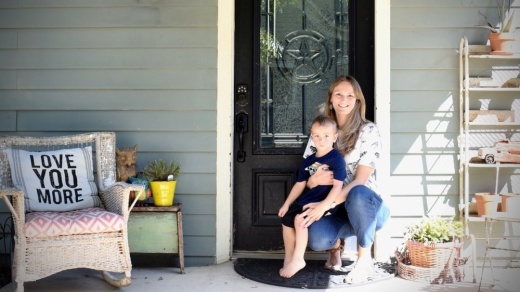The pair were visiting the week of Sept. 13, the third trip in recent years for medical reasons. The short-term rental they found on Airbnb is among hundreds across Frisco that will soon be required to register with the city. City Council passed an ordinance which goes into effect Nov. 15 as part of an effort to address public safety and ensure hotel occupancy taxes get collected.
“We like meeting new people,” she said of staying at homes for rent on the Airbnb website. “It’s always the case that you actually meet a new family, meet new people, and you have the chance to maybe use a yard and aren’t confined to one small room.”
Beginning Nov. 15, Frisco property owners looking to rent out space for less than 30 days at a time will have to apply for a city permit online, pay a $300 annual fee plus city hotel taxes, provide floor plans, set a maximum number of guests and meet other requirements. No formal deadline has been set for existing properties to register.
City staff say the ordinance aims to protect neighborhoods from noise disturbances and code violations, preserve residential housing and ensure proper tax collection from owners of homes listed on sites such as Airbnb and Vacation Rental by Owner (VRBO). However, both short-term rental owners and other city leaders have mixed feelings.
Settling for the status quo
Matt and Brooklyn Calloway own the guest house the Jackson family rented, and have listed it on Airbnb for the last two years. Regarding the new ordinance that will charge fees and enforce stricter rules for rental owners, Matt Calloway let out a heavy sigh.
“I’m against the city trying to regulate it, but I think that if they’re going to, I’m OK with the ordinance they put together,” he said. “I’m just afraid that they’re going to keep moving the needle on this down the road.”
The Calloways said their guest house has been booked 80%-100% of each month since they started using Airbnb. Not a single visit so far has taken a turn for the worse, Matt Calloway said.
Surrounding cities take different approaches toward short-term rentals. McKinney and Plano collect city hotel taxes in an agreement with service providers such as Airbnb.
Matt Calloway said an ordinance as far-reaching as Frisco’s is unnecessary. He added that his family already pays all required hotel occupancy taxes through the Airbnb app. The city’s ordinance aims to make sure property owners pay the 7% city tax in addition to the 6% state tax.
“We’ve had such a positive experience,” he said. “Seeing the so-little negative experiences, and that they crafted the ordinance just because of so few incidents out of so many thousands and thousands of nights and days was a little bit disheartening.”
Mike Scarlett owns property in Frisco and lists it for rent on Airbnb. He said he is fine with the ordinance.
“I think a small annual fee is fine, and I think it’s fine to make sure that people are sleeping in a safe environment,” Scarlett said.
Scarlett works as a building contractor and has rented out property on North County Road for the past four months. He said the demand is huge and bigger than he initially expected.
The city taking steps to enforce safety standards is necessary, Scarlett said.
“I’m fine with the status quo as far as having the fee and passing an inspection,” Scarlett said. “I know that somebody could be staying at a place that has all sorts of safety concerns.”
Responding to unrest
Leading up to the new ordinance passing, Frisco police identified 25 short-term rentals through 92 calls for service to those properties between 2019 and 2021. Calls included noise complaints, domestic disturbances, drug activity, harassment and parking issues.
That number is not enough to merit a new ordinance, according to Mayor Pro Tem Bill Woodard. Woodard was the sole vote against the ordinance at the Aug. 17 council meeting.
“I don’t know that the burden of the permit process outweighs the fact that it’s only a handful of properties,” Woodard said.
He argued that the city should try other avenues before enacting an ordinance. These might include expanded work with third-party police liaisons with Airbnb, VRBO and Expedia, according to Frisco police.
The council member also added that the city could look to resolve problem rental properties through litigation. The ordinance adds layers of rules for everyone that Woodard said he believes are unnecessary.
“We could end up revoking the permit and then having to take them to court to get an injunction to get them to stop renting,” Woodard said. “The ordinance doesn’t do much other than what we already have in our power.”
Michael Armistead serves on The Landing at Waterstone Homeowners Association board and offered a different opinion.
The six-year resident and small-business owner said he sees “the good, the bad and the ugly” of home ownership and believes the ordinance provides accountability.
“If [this guideline provides] some structure, I don’t believe it is an overreach of the City Council’s power,” Armistead said.
Armistead praised Frisco for including language in the ordinance that requires a 24/7 emergency contact.
“I don’t think it is too far to ask the homeowner to provide some basic information and follow some basic guidelines so that there are recourses that can be taken by the community in order to get that taken care of after the fact,” he said.
According to City Code Enforcement Supervisor Penny Curtis, a main goal of the ordinance is to compile a database of short-term rentals in Frisco. Throughout City Council workshops and meetings, Curtis said the city has no way of knowing exactly how many short-term rental properties are in Frisco, and requiring a fee covers labor costs. The city will pay an estimated $40,000 a year in administrative costs to fund the ordinance.
Curtis said the city can already visit properties in violation of existing city codes, such as parking violations and unkempt grass. The new short-term rental ordinance adds another layer, according to Curtis, allowing the city to potentially revoke a short-term rental permit for code violations.
“If a violation is occurring ... [and] we get a complaint, we’re going to go out and inspect it just like if it was a long-term property,” Curtis said. “We’re going to go out and inspect those, and we’re going to take care of that problem right then.”
Business affairs
Frisco resident Brittany Lowe said managing an Airbnb during early pandemic months helped her in a time of unemployment.
Lowe has been renting out property for about a year now and lives near her rental property. She said the ordinance will help improve the local industry by keeping out property owners who are not committed to short-term renting.
“I think if you’re serious about it, it may weed out some of the folks who are going to do it on a whim here and there,” Lowe said.
Lowe’s rental and others like it pose direct competition to hotels in Frisco. But Marla Roe, executive director of marketing group Visit Frisco, said short-term rentals do not have enough steam to upend the city’s hotel industry.
Roe said many visitors enjoy amenities and services hotels typically offer, like onsite bars and restaurants, and housekeeping. The regulation will not have a large effect on tourism in Frisco, she added.
“The ordinance is not set to penalize short-term rentals, but to help the city keep track of where those STRs are and who the owners of the homes are in cases of disturbances or incidents where the homeowner would need to be contacted, much like a hotel manager would be contacted for an incident at a hotel,” Roe said. “It is a very small fee for the homeowner to register, so it should not impact those few visitors who prefer an STR over a hotel.”
Frisco Police Officer Kayla Carney said the city has a variety of tourist venues that make it attractive for both short-term rental owners and guests.
"As the growth of the city continues, there is an inherent increase of short-term rentals within the city,” she said. “The Frisco Police Department is looking into solutions that will facilitate a positive compliance of all state and local laws as well as support the continued attraction to the city.”
As development continues in Frisco, city officials have said they look to get ahead of unlawful activity that may occur in short-term rentals.
Lowe said her experience with tourists—including visitors to The Star and Toyota Stadium—have only been positive.
She has hosted close to 70 people since first renting out space and described the worst of them as “messy.”
“I don’t mind it. I think if you are committed to operating Airbnb as a business, that’s part of running a business,” Lowe said. “I would love to own multiple Airbnbs in the city.”





